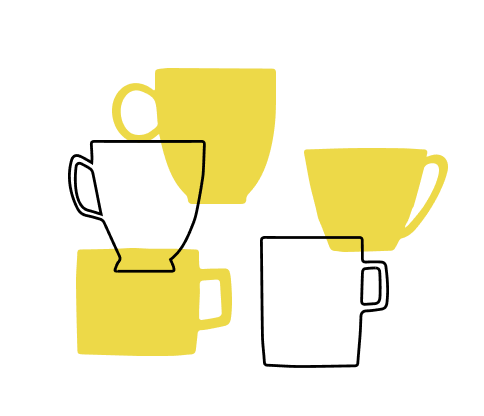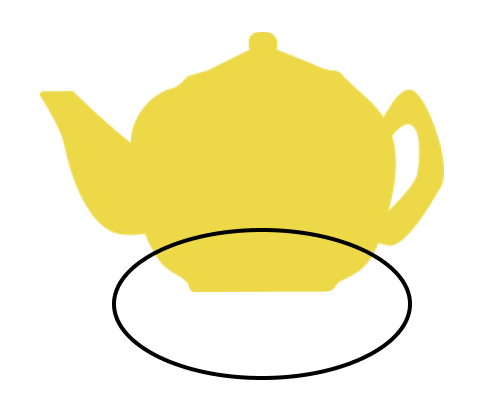
Workshops
Hands-on workshops are a great way to gain new skills and get into the nitty gritty of a specific subject without committing to a full semester.
Learning through collective knowledge is also an amazing way to share the expertise between makers. We’ll be building our workshops with you in mind, so let us know what you want to learn!
Summer 2025 Workshops - These 4 week sessions are the perfect way to try something new, hone your skills over the summer or supplement your semester classes.
Get a Handle on Mugs
-
This course is dedicated to analyzing everything about mugs and mug handles – what informs our decisions on form, function, and design, and what techniques can be employed to carry out our optimal mugs.
-
This class is for students who have experience with clay already, and will focus on wheel-throwing. Students should be able to wedge, center clay, and make basic cylinders without help.
Teapots!
-
This course is dedicated to learning about the forms and anatomy of teapots – bodies, galleries, lids, & spouts. This is primarily a wheel-thrown class that requires a level of proficiency in wheel-throwing. Students should be able to wedge, center clay, and make a variety of forms on the wheel beyond cylinders. The class will also include a number of handbuilt elements, but students will not need to have extensive handbuilding experience.
-
This class is for students who have experience with clay already, and will focus on wheel-throwing. Students should be able to wedge, center clay, and make basic cylinders without help.
NEW! Upcoming 1-Day Workshops in September
Mold Making 101 with Catalina Parra of @baseceramics
-
This hands-on workshop introduces participants to the fundamentals of plaster mold making for ceramics. Participants will be provided objects by the instructor to make molds out of and will learn how to properly measure, mix and work with plaster using the provided object. Each participant will choose between making either two one-part molds or one two-part mold, depending on their interest and comfort level.
Materials will be provided by the studio (already included in class cost). An agenda and additional information will be emailed to participants ahead of the workshop.
-
Part 1: Introduction
• Overview of how plaster molds are used in ceramics
• Slip casting demo using a plaster mold
• Do's and don’ts of working with plaster
• Mixing plaster: proper ratios, timing, and safety tips
Part 2: Mold Setup Demo
• Demo on preparing both one-part and two-part mold setups
• Key considerations: registration marks, parting lines, sealing, and mold walls
• Group Q&A before students begin
Part 3: Mold Making
• Each participant selects a provided object
• Individual setup for one-part or two-part mold based on choice
• Measuring and calculating plaster and water volumes • Mixing plaster and pouring molds Conclusion & Wrap-Up
• Open Q&A for troubleshooting and next steps • Studio and table cleanup
Slip Casting for Beginners with Catalina Parra of @baseceramics
-
This beginner-friendly workshop introduces participants to the fundamentals of slip casting.
Students will learn how to use different slips, cast with plaster molds, and attach shape and
patterns. Each participant will make and take home two pieces:
• One cup with 2 tones of slip patterns
• One cup with added attachments
-
Part 1: Introduction
• Overview of slip casting
• Introduction to plaster molds and slip materials
Part 2: Slip Application & Casting
• Demo: Mixing color stains into slip to create custom colored slips
• Each participant will use different color slip to create patterns in a plaster mold and cast the first cup. Timers will be set for 60–70 minutes for the casting process
Part 3: Seams & Attachments (60–80 minutes)
• Learn how to clean seams and prepare cast surfaces
• Learn how to attach pre-made shapes/handles to a provided leather-hard cup
• First cups will be poured out, left to rest for 10 minutes, then flipped to cut the rims.
Other workshops we offer from time to time, dates tba
Glaze Making 101:
The Basics to Get You Started
-
Curious About Glazes? Wondering what a frit is and what it does? Want to know how and why these various chemicals make things shiny, matte, or bubbly? We want to get you on the path of learning how to navigate the mysteries of ceramic glazes.
-
In this 3 day workshop, you will learn how to make three base glazes (gloss, matte, and clear) and create variations with each using stains and oxides. For anyone looking to make their own glazes, this is a perfect way to enter the world of glaze mixing as you begin your journey.
Day I (November 4th - 2-5pm) - We’ll kick off with a lesson and discussion on glaze vocabulary and what the various categories of chemicals do when added to a glaze recipe. Students will receive a handout they can keep. Next, you’ll learn about the various ways to make test tiles as you prepare to make your own set. These will be submitted at the end of class for bisque firing.
Day II (November 18th - 2-7pm) - Students will learn how to read a glaze recipe, measure, mix, and alter 3 base glazes, then add stains and oxides and adjust and dip tests onto their tiles.
Day III (December 9th - 2-5pm) - The test results will be ready and students will assess, compare and converse. Since this is the launch point, a discussion of various other types of glaze will be reviewed and there will be time for Q&A.
Mold Making 101: Learning the Basics, from Plaster to Slip
-
This hands-on workshop introduces participants to the fundamentals of plaster mold making for ceramics. Participants will be provided objects by the instructor to make molds out of and will learn how to properly measure, mix and work with plaster using the provided object. Each participant will choose between making either two one-part molds or one two-part mold, depending on their interest and comfort level.
Materials will be provided by the studio (already included in class cost). An agenda and additional information will be emailed to participants ahead of the workshop.
-
Part 1: Introduction
• Overview of how plaster molds are used in ceramics
• Slip casting demo using a plaster mold
• Do's and don’ts of working with plaster
• Mixing plaster: proper ratios, timing, and safety tips
Part 2: Mold Setup Demo
• Demo on preparing both one-part and two-part mold setups
• Key considerations: registration marks, parting lines, sealing, and mold walls
• Group Q&A before students begin
Part 3: Mold Making
• Each participant selects a provided object
• Individual setup for one-part or two-part mold based on choice
• Measuring and calculating plaster and water volumes • Mixing plaster and pouring molds Conclusion & Wrap-Up
• Open Q&A for troubleshooting and next steps • Studio and table cleanup
Nerikomi: An Exploration of Color & Pattern
-
Nerikomi is a fascinating technique that centers around the decorative process established in Japan. This technique involves layering colored clay and then slicing through the cross-section to reveal intricate patterns. The results reflect a combination of both careful planning and accidental surprise. This course will explore the possibilities of using the Nerikomi technique to create unique patterns and forms.
-
Class I
Students will be given stains and clay to mix together to produce various colors as well as learn how to make patterns ‘canes’ that will be used to make forms later on.
*Students can come in for benchtime to work on their canes.
Class IIWe will make slabs from previously made patterns which can be formed into various objects like cups, bowls, and anything that can be made from a slab. A smoothing demonstration will happen so students can do this clean up before submitting work for bisque firing.
*Students can come in for benchtime to work on their pieces, trim.
Class III
Sanding of bisqued pieces and glazing works to be fired. Clarity of the pattern is achievable at this stage.
A Certain Slant of Light: Making Lamps by Hand
-
In this 2-day hands-on workshop, students can choose between hand building or wheel throwing a lamp base, glaze it, then learn how to wire it up.
-
Class I
Students will be given stains and clay to mix together to produce various colors as well as learn how to make patterns ‘canes’ that will be used to make forms later on.
*Students can come in for benchtime to work on their canes.Class II
We will make slabs from previously made patterns which can be formed into various objects like cups, bowls, and anything that can be made from a slab. A smoothing demonstration will happen so students can do this clean up before submitting work for bisque firing.
*Students can come in for benchtime to work on their pieces, trim, and must submit work for firing by 7/30.
Class III
Sanding of bisqued pieces and glazing works to be fired. Clarity of the pattern is achievable at this stage.
Get notified of upcoming classes, workshops, and events!
Sign up with your email address to receive news and updates
Workshop Details
Workshop Cancellation Policy:
To request a cancellation and full refund minus a $50 processing fee, you must contact us in writing within 1 week prior to the first class of your workshop. Request within 1 week of the first class and you’ll receive a credit for a future class minus a $50 cancellation fee. There are no refunds for cancellation requests made within 48 hours before the start of the workshop or for no-shows. Email info@clayspacebk.com with your cancellation request.
We May Cancel:
If the class does not fill sufficiently, we may cancel and try to move students to another class, apply tuition to another class, semester, or gift card, or provide a full refund.
Missed Class Policy :
There will be no make ups and no refund for missed classes.







